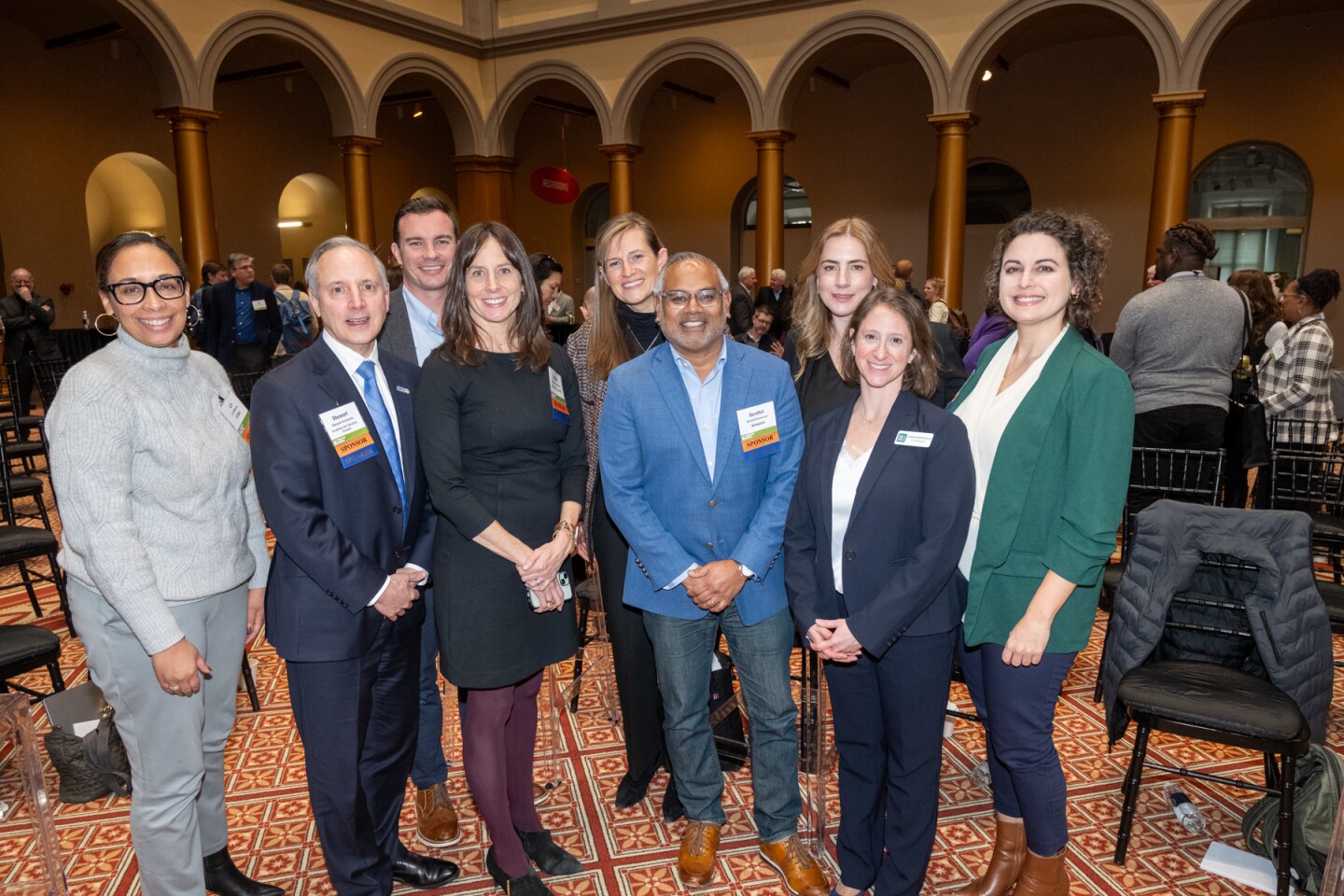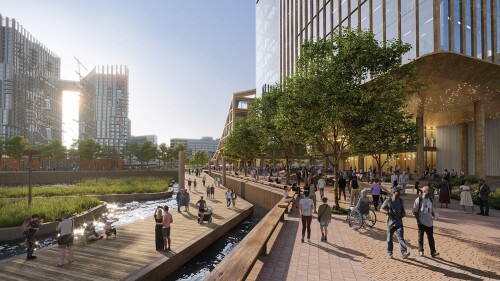Yesterday, more than 400 commercial real estate professionals and elected officials gathered at the National Building Museum for the third annual Future Forum, a regional conference for public and private-sector leaders.
The conference was developed by ULI Washington with collaborating partners, the Coalition for Smarter Growth (CSG), DCBIA, Greater Greater Washington, and the Metropolitan Washington Council of Governments. Amazon was the program sponsor and the National Building Museum was the program partner.
“The idea today is to inspire creative ideas that we can take forward with us as a region and try to move things forward in a positive direction,” said co-host Evan Goldman, executive vice president of acquisition and development at EYA, a ULI Washington Annual sponsor. “Most importantly, a third of the people at this event are public sector employees or elected officials, and that is a huge testament to getting that feedback from the audience last year and making a huge effort to make sure the right people are in this room for this conversation, so we can partner moving forward.”
To that end, the first session, titled Transforming Cities: A Conversation on Leading Change, featured former Oklahoma City mayor and ULI Canizaro/Klingbeil Fellow for Urban Development Mick Cornett, who was interviewed by Stephanie Landrum, president and CEO of Alexandria Economic Development Partnership.
![DSC_0193[1].jpg](https://cdn-ul.uli.org/dims4/default/3895482/2147483647/strip/true/crop/1800x1013+0+93/resize/1000x563!/quality/90/?url=https%3A%2F%2Fk2-prod-uli.s3.us-east-1.amazonaws.com%2Fbrightspot%2Fef%2F6e%2Fbbacc3054a61abb10fcf1b238d1b%2Fdsc-01931.jpg)
The first session of ULI Washington’s 3rd annual Future Forum was titled “Transforming Cities: A Conversation on Leading Change” and featured former Oklahoma City mayor and ULI Canizaro/Klingbeil Fellow for Urban Development Mick Cornett who was interviewed by Stephanie Landrum, president & CEO of Alexandria Economic Development Partnership.
The former sportscaster turned four-term mayor turned author and consultant, Cornett shared lessons from his economic development experience in transforming Oklahoma City from a dying town most known for the historic 1995 bombing and an out-migration of young people to a city with an NBA team, the Oklahoma City Thunder, and a sports stadium, the $89.2 million Paycom Center (opened in 2002)—as well as future host of women’s softball and canoe slalom events during the 2028 Summer Olympics in Los Angeles.
Landrum said that Washington, D.C., is a “company town, and the company is the federal government. Our big industry, the government, isn’t happy, and they are downsizing, similar to other cities that are company towns . . . . As part of your story, you were telling me and some others about how you were trying to attract young people back to Oklahoma City, and the D.C. area was one of the places that you looked at as somebody who was doing it right?”
“Oklahoma City had become a city with extremely low standards, and it was only after we started raising our standards that the economy started to improve. And what I mean by that is, you’re not going to have businesses with high standards in a city with low standards,” Cornett said. “We were trying to throw incentives at companies that would come in and save us, or we, you know, we kept thinking, maybe the federal government will come in and save us. And finally we realized no one was coming to save us. And I think every city needs to kind of go through that.”
In contrast, Cornett said, “This region probably has . . . higher standards of any metro, any city, in the United States. And, so you know, you don’t need higher standards than Washington, D.C., and you do need to diversify your economy. But what you have going for you is, you are probably the ultimate success story in one extremely important area—and that is the ability to attract highly educated young people.”
The former mayor noted that “If you can attract highly educated young people, your economy is pretty much going to take care of itself, because it’s an extremely entrepreneurial, tech savvy generation. They are going to create jobs for themselves and their friends.”
Your city is who your sports teams play.
Cornett also pointed to the region’s ability to partner and collaborate to attract Amazon and its HQ2 to National Landing in Crystal City, Virginia, despite fierce competition nationwide: “They weren’t looking for the best bargain on land and incentives. They were looking at the best place for decades to come, with the workforce that they thought they needed to grow their company.”
Alongside other advice to elected leaders and public officials, Cornett noted that it’s important to become a place members of the development community can count on. Otherwise, they are “likely going to choose to invest in other places where they think their rate of return is more predictable.”
A city’s sports team is also important. “
And for a hundred years, we were playing Amarillo and Little Rock and Wichita and Portsmouth and, you know, those are all fine places. But now our sports team plays Chicago and Washington and Los Angeles.”
Like TED Talks . . .
ULI Washington also unveiled its first annual CREDTalks, featuring competitively selected participants to offer ideas on Collaborative Regional Economic Development (CRED).
Letting it go
Calvin Gladney, president and CEO of Smart Growth America, delivered a CREDTalk titled, “Rethinking Downtown.” Gladney noted that Blockbuster Video didn’t believe there would be a paradigm shift from video to streaming and passed up an opportunity to buy Netflix for $50 million. Similarly, Borders Books went bankrupt as the paradigm shifted to Amazon and buying books online.
“This little upstart—pretty simple—called Amazon, started in somebody’s garage,” Gladney said. “Please. Nobody’s going to buy their books online. This is stupid. They want an experience. They want us. They couldn’t let it go. They were, like, books will be forever. Physical books.”
Similarly, Gladney talked about the “monoculture of office buildings” dependent on workers going downtown to the office, five days a week. “Everybody goes there all day, your whole week, your whole life, is kind of revolving around this energy of going downtown five days a week. You spend a lot of money. They will spend . . . evenings there. You spend your happy hours there. This is what we believe will always be true, except that there’s some things happening. Hybrid is here to stay. People are not going back five days a week.”
Gladney’s solution? “We need to think about these buildings as regional assets . . . these downtowns, not as downtowns, but a regional assets,” he said. “And then we have to say to ourselves: What problems are we trying to solve in the region, based on having these regional assets?”
Transportation
Randy Clarke, general manager and CEO of Washington Metropolitan Area Transit Authority, delivered a CREDTalk titled, “Shaping the Future of DMV Transit.”
“We’ve got very bifurcated . . . local jurisdictional planning model, and now we have 10 operators, and everyone’s doing some version of their own plan,” Clarke said. “There’s definitely collaboration, coordination, but there’s a lot of cooks in the kitchen doing different things.” He went on to say it is his belief that “We need to get back to having a regional sense of what we are doing,” and that means stitching together a vision of what “the DMV will look like . . . in 2030, 2040, 2050.”
Community stewards
Ayesha M. Hudson, founder and CEO of A-Peace, a property manager and real estate developer focused on providing sustainable, resident-centered living experiences, delivered a CREDTalk titled, “Take Back the Future.”
Hudson said, “My grandfather . . . he purchased his first piece of land in 1958, in Washington, D.C.—his first deed. Twenty years later, I came, and [twenty years after that, I purchased] my first investment property.”
A key takeaway: “Invest in your community, develop your community, so you can sustain what you want in your community.”
All work, no play
Rebecca Rockey, deputy chief economist and global head of forecasting at Cushman & Wakefield, delivered a CREDTalk titled, “All Work and No Play—Reimagining Cities.”
“Over half of all real estate square footage is tied up in some form of office, whether it’s GSA, federally owned, whether it’s owner occupied or on the private rental market,” Rockey said. “And, in fact, on average, across our cities, 70 percent of downtown real estate is some form of work. We have gone all in on work, and we really don’t have a lot of play.”
Restitching together downtown
Eran Chen, founder and executive director of design firm ODA, delivered a CREDTalk titled, “Intensity and Intimacy.”
Using New York City as an example, he said that there was a balance in the “way that life spilled over from the street, from the windows to the stoop, to the sidewalk, where the street was everybody’s kind of backyard, yet it was part of a huge circuit of urban intensity.”
To recapture that balance, Chen said, “We have broken the New York City zoning regulations of ‘Two Donut Building’ into a sequence of small courts—all pedestrian courtyards that are interconnected through an alleyway that we made a public park.”
Chen acknowledged that people will not use cities in the way they did pre-Covid: “What we want to do is, we want to create a sense of urban intimacy that would draw people into the street level, disregard the office space. And if we do that, we can create value of the building above. We basically can reverse the script.”
Flipping the script would entail redeveloping the private alleyways that spider throughout the city. Creating privately owned public spaces that are beautifully landscaped, and activated by affordable retail, would begin shifting the use of downtown space to include more residential and attendant services such as schools, playgrounds, and doctor’s offices.
Afternoon and closing
After lunch, attendees were treated to a Fishbowl Conversation, a dynamic, collaborative talk where diverse voices come together to transform insights shared throughout the day into impactful solutions for the region. The Fishbowl is not open to press coverage, but it features more than 20 experts, who came from across the region—the D.C. mayor’s office, the Prince George’s County Council, the Arlington County Board, and many others.

Thanks to our sponsors: Liz DeBarros, CEO, DCBIA; Stewart Schwartz, executive director, Coalition for Smarter Growth; Clark Mercer, executive director, Metropolitan Washington Council of Governments; Colleen Hawkinson, executive director, DC BID Council; Bailey Edelson, principal, Buchanan Partners; Senthil Sankaran managing principal, Amazon Housing Equity Fund, Amazon; Aileen Fuchs, president & executive director, National Building Museum; Deb Kerson Bilek, executive director, ULI Washington; Chelsea Allinger, executive director, Greater Greater Washington.
ULI
The day closed with final thoughts: Chelsea Allinger, Greater Greater Washington; Deb Kerson Bilek, ULI Washington; Liz DeBarros, DCBIA; Aileen Fuchs, National Building Museum; Colleen Hawkinson, DC BID Council; Clark Mercer, Metropolitan Washington Council of Governments; Deborah Miller, LandDesign; Senthil Sankaran, Amazon; Stewart Schwartz, Coalition for Smarter Growth.
Related reading:
Embracing the Future of Downtown D.C. at the Second ULI Washington Future Forum
ULI Washington’s Second Annual Future Forum: Navigating the Potential of the Region

![IMG_9889[1].JPG](https://cdn-ul.uli.org/dims4/default/a877c49/2147483647/strip/true/crop/5712x4284+0+0/resize/1440x1080!/quality/90/?url=https%3A%2F%2Fk2-prod-uli.s3.us-east-1.amazonaws.com%2Fbrightspot%2F44%2F9f%2F1ad4a6684815aa39dacc30bf931a%2Fimg-98891.JPG)
![IMG_9822[3].JPG](https://cdn-ul.uli.org/dims4/default/3d5d2db/2147483647/strip/true/crop/4032x2270+0+377/resize/1000x563!/quality/90/?url=https%3A%2F%2Fk2-prod-uli.s3.us-east-1.amazonaws.com%2Fbrightspot%2Ff7%2F88%2F1f990a4e4136863036c5503eb1d2%2Fimg-98223.JPG)
![DSC_0291[1].jpg](https://cdn-ul.uli.org/dims4/default/654f923/2147483647/strip/true/crop/1800x1200+0+0/resize/1440x960!/quality/90/?url=https%3A%2F%2Fk2-prod-uli.s3.us-east-1.amazonaws.com%2Fbrightspot%2Fd4%2F93%2F96a911a04d9f8855a30edcde1ebd%2Fdsc-02911.jpg)
![IMG_9851[3].JPG](https://cdn-ul.uli.org/dims4/default/eac79ae/2147483647/strip/true/crop/4032x2270+0+377/resize/1000x563!/quality/90/?url=https%3A%2F%2Fk2-prod-uli.s3.us-east-1.amazonaws.com%2Fbrightspot%2Fa9%2Fe8%2Fcade9d6d4d28a2564132bc816e9b%2Fimg-98513.JPG)
![IMG_9866[3].JPG](https://cdn-ul.uli.org/dims4/default/99e0885/2147483647/strip/true/crop/3024x1703+0+1165/resize/1000x563!/quality/90/?url=https%3A%2F%2Fk2-prod-uli.s3.us-east-1.amazonaws.com%2Fbrightspot%2Fd5%2Fb2%2F684ac2d14cd98cb8f8e463c009c3%2Fimg-98663.JPG)

![IMG_9881[3].JPG](https://cdn-ul.uli.org/dims4/default/6bfa16a/2147483647/strip/true/crop/3024x4032+0+0/resize/1440x1920!/quality/90/?url=https%3A%2F%2Fk2-prod-uli.s3.us-east-1.amazonaws.com%2Fbrightspot%2F8d%2F60%2F44e0d4cf458f9b688e8f69d03eea%2Fimg-98813.JPG)



![IMG_2896[1].JPG](https://cdn-ul.uli.org/dims4/default/a6f9030/2147483647/strip/true/crop/4032x2266+0+7/resize/500x281!/quality/90/?url=https%3A%2F%2Fk2-prod-uli.s3.us-east-1.amazonaws.com%2Fbrightspot%2F80%2F39%2F205699104776b5d89f410b5cd438%2Fimg-28961.JPG)
